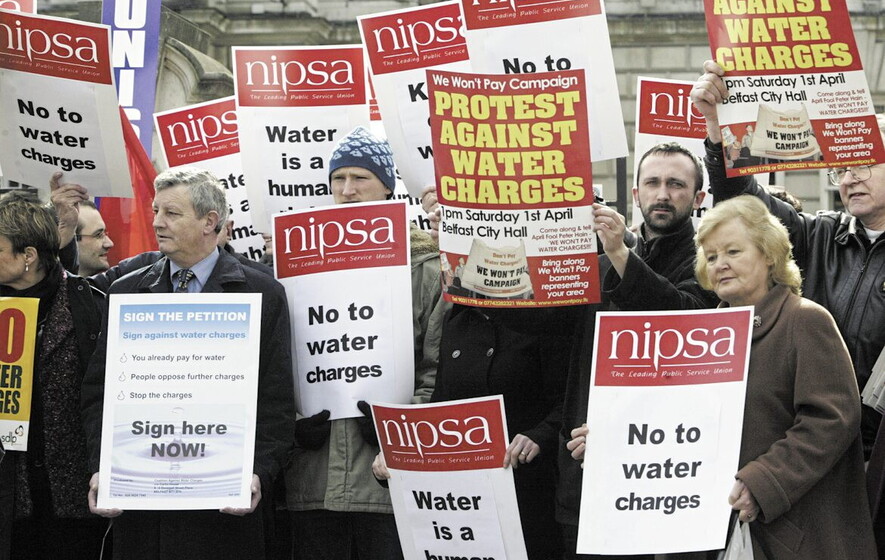By Daniel Waldron
The threat of water charges is back on the agenda. In a statement regarding the next Northern Ireland budget, Tory Secretary of State Chris Heaton-Harris said that “difficult choices cannot be deferred any longer” and that water charges are one of the options under consideration. It seems that this is an attempt to cajole the DUP back into the Executive, fearing the uproar it would create, particularly amidst the current cost-of-living crisis.
The introduction of domestic water charges was one of a number of neoliberal, pro-corporate measures agreed to in principle by the main Stormont parties in 2002. The aim of such charges is to lay the basis for full privatisation of this essential service so that it can be run for profit, with Northern Ireland Water becoming a ‘government-owned company’ in 2007 as a step in that direction. If we look at England and Wales, we see where this leads, with average annual bills now standing around £420.
Undoubtedly, we need to use water efficiently, especially in the context of the capitalist-driven climate crisis. It is nonsense, however, to suggest that ordinary people wilfully waste water. The vast majority of water wastage is caused by our antiquated infrastructure, which has been neglected by successive Westminster and Stormont administrations for decades, despite householders paying for the water service through their rates. The cost of rectifying this problem should not be placed on the shoulders of ordinary people already struggling to make ends meet. Water charges will inevitably hit working-class families hardest. Investment in water and other essential services should be funded by taking wealth from the super-rich and big business.
The key reason water charges have not yet been introduced here is the threat of mass non-payment, organised primarily by the We Won’t Campaign, in which the Socialist Party played a leading role. In the mid-2000s, the campaign organised grassroots opposition to the charges through community meetings and campaigning across Northern Ireland. Over 100,000 people signed a non-payment pledge, and the campaign won the backing of a number of trade unions. This put the main parties under huge pressure and forced the ‘Labour’ government to shelve the plans, realising they were unworkable and could lead to political upheaval. Similarly, a mass non-payment campaign forced the scrapping of water charges in the South in 2017, with Socialist Party activists and elected representatives again central to the movement.
Whether they are sitting in Stormont or not, we cannot rely on the DUP, Sinn Féin or the other main parties to block water charges, as shown by their track record of implementing cuts, privatisation, ‘welfare reform’ and so on. The Alliance Party has consistently backed the proposals, and even the Greens have supported ‘progressive’ water charges. If this threat is seriously posed, we need to again build support for mass non-payment in every city, town and village across the North, linked to the power of workers organised in the trade unions, and demand a publicly owned, democratically run and high-quality water service which is free at the point of use.












